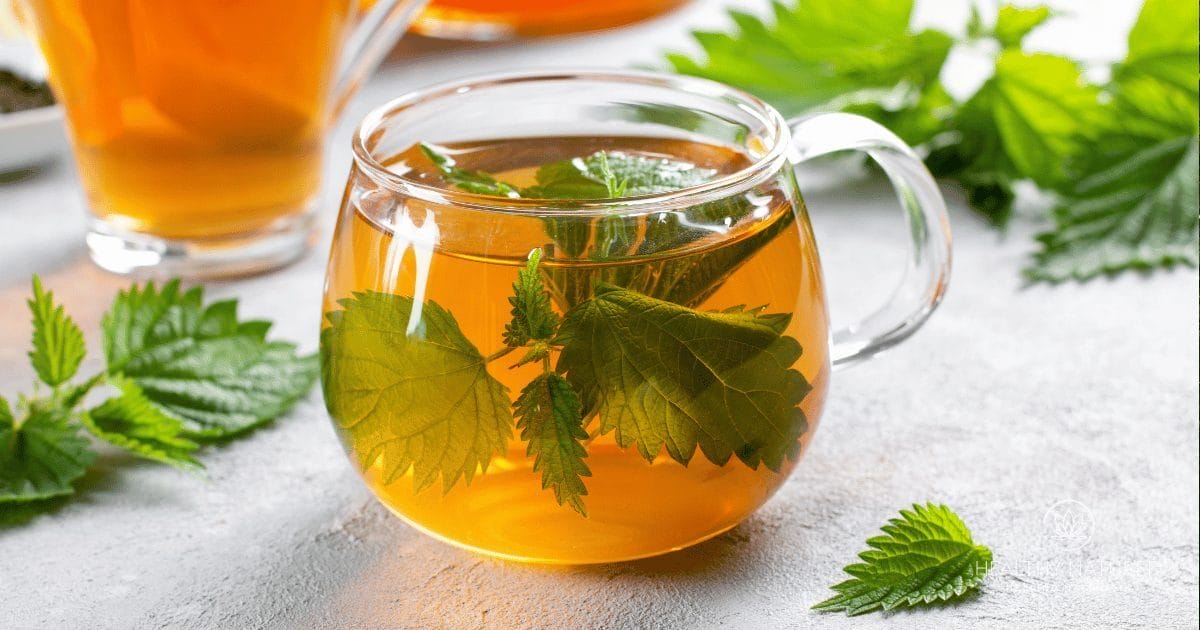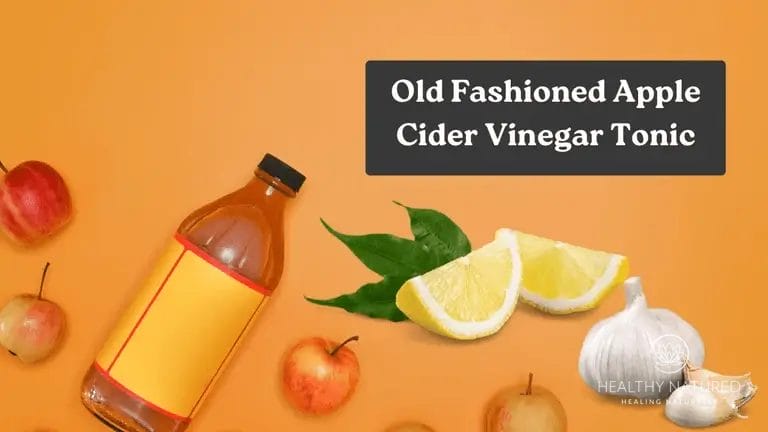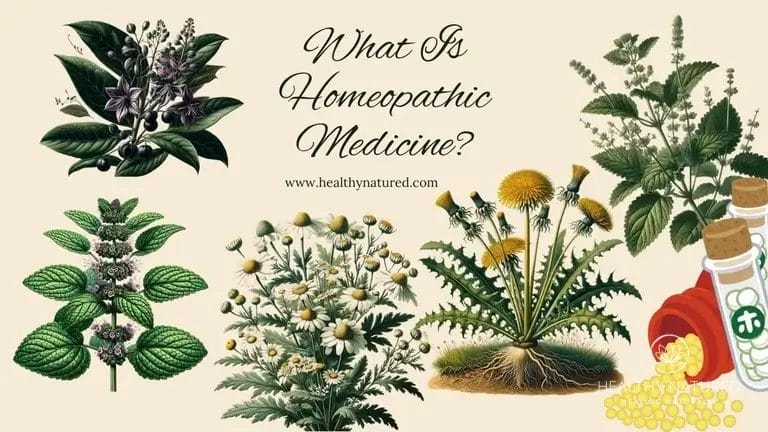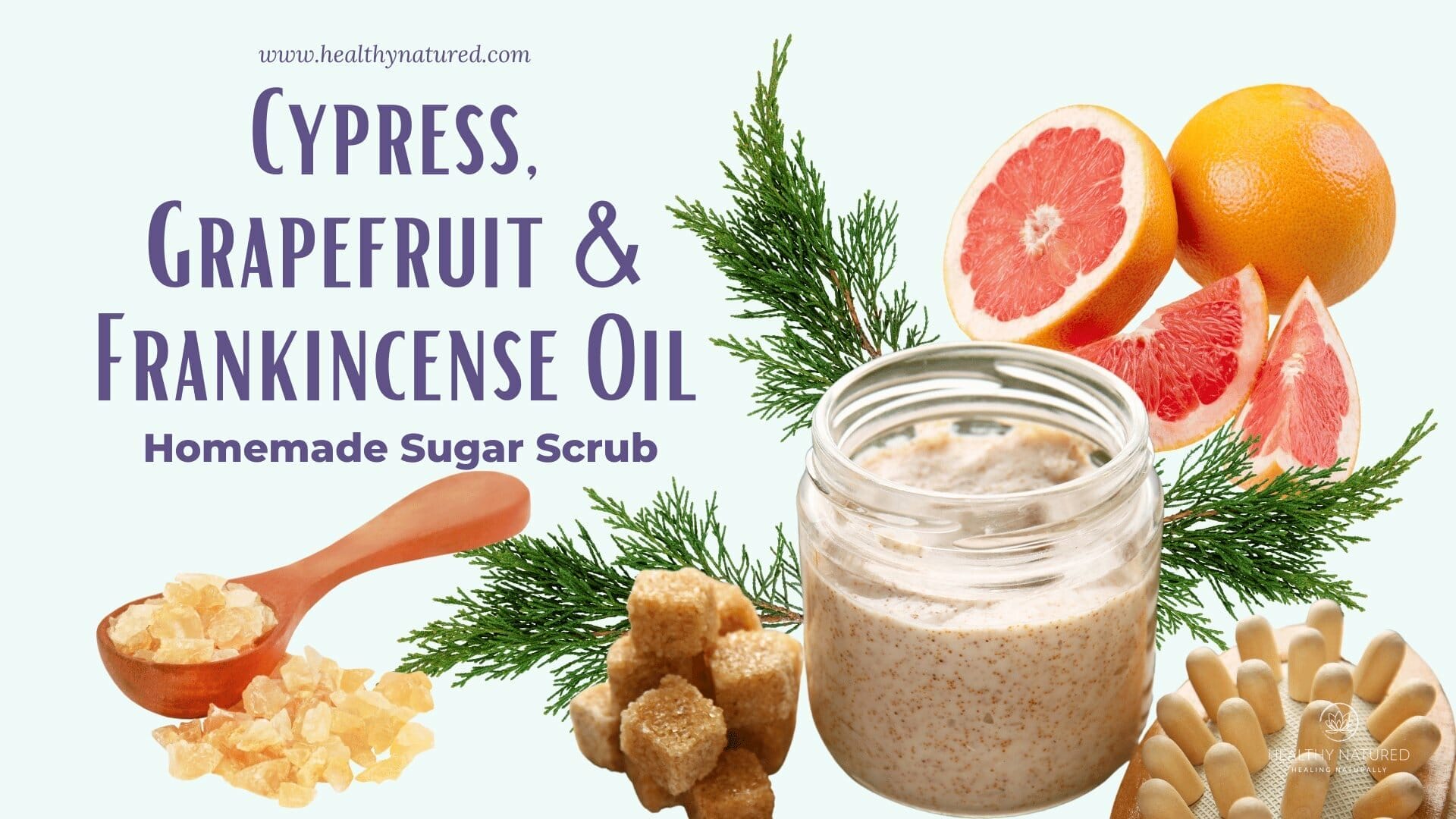New research reveals that nettle root tea health benefits stem from over 30 unique bioactive compounds. That’s a huge variety of potential health benefits to your daily ritual.
Trust me, you’ll taste the earthiness, but the true magic is in its powering your hormonal balance, anti-inflammatory, and natural energy boosting properties.
A lot of people find that it’s a kind friend for your health. To see how nettle root tea complements your health journey, let’s get into it.
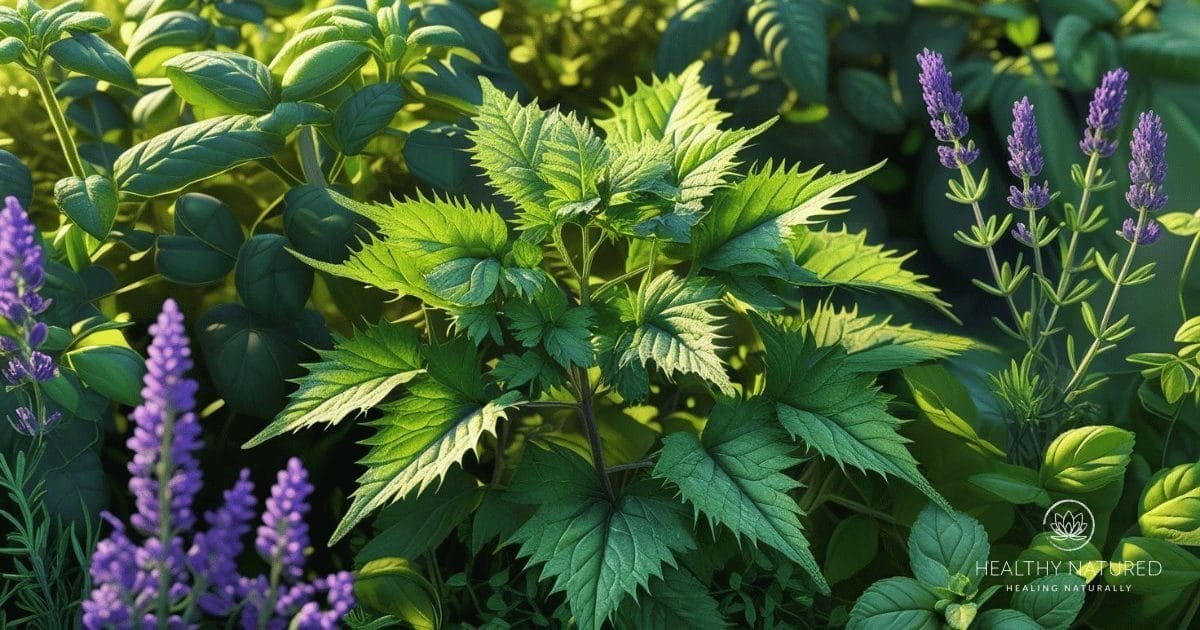
Key Takeaways
- Nettle tea has different health benefits than the leaf, meaning you can pick the part of the plant that fits your wellness agenda.
- Full of vitamins, minerals and antioxidants, it boosts your immune system, hormonal balance and overall vitality.
- Nettle is an excellent herbal tea for prostate health, inflammation, and healthy skin and hair.
- Nettle root tea, when prepared as a decoction, is more potent and exploring its complementary flavors can add some spice to your tea time!
- While nettle tea is typically safe, it should be consumed in moderation and you should speak to your healthcare provider if you have underlying health conditions or take medications.
- Pair the holistic powers of nettle with your healthy eating habits and other self-care rituals for mind-body healing.
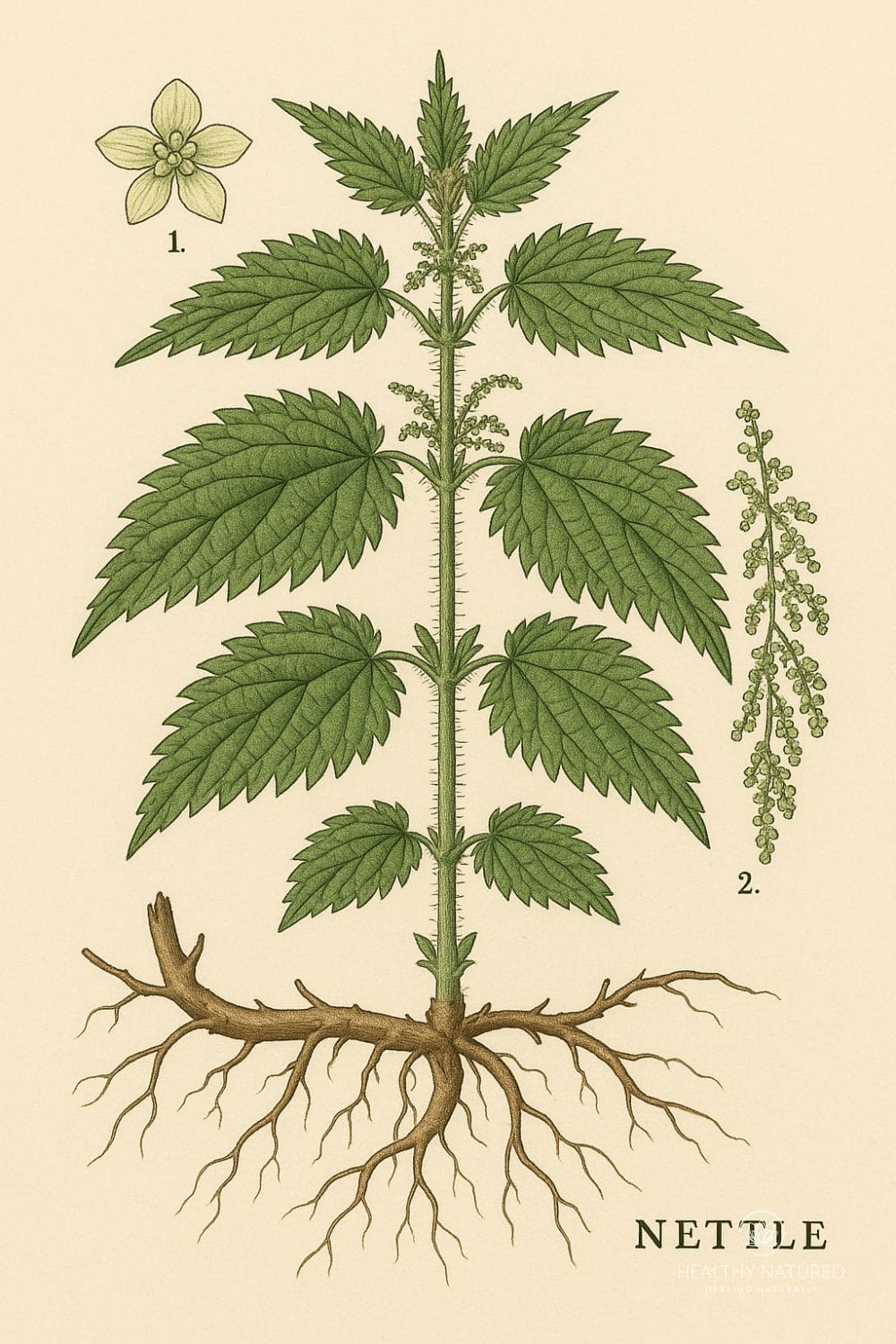
Understanding Nettle Tea
Nettle tea is derived from the stinging nettle plant, a perennial herb with emerald leaves and thin roots. Although root and leaf are used in herbal preparations, their benefits are not interchangeable. Leaf or root, the tea is appreciated worldwide for its smooth, earthy flavor and wide variety of nutrients.
You’ll see it in the form of whole dried leaves, chopped root bits and potent extracts—each boasting its own distinct nutritional profile. In folk medicine, from Europe to Asia, cultures have turned to nettle infusions to bolster vitality, calm inflammation and enhance digestion. One thing holds true across traditions: the quality of your nettle matters.
Freshly harvested, organic leaves and roots provide the most nourishing benefits, so always seek trusted suppliers.
Root vs. Leaf
|
Component |
Nettle Root |
Nettle Leaf |
|---|---|---|
|
Main Nutrients |
Lignans, sterols |
Vitamins A, C, K, iron |
|
Key Actions |
Hormone support |
Anti-inflammatory |
|
Use Cases |
Prostate, hormones |
Digestion, joints |
Nettle root’s medicinal emphasis differs from the leaf. Root extracts are most commonly employed to support urinary health, particularly in men, as well as hormone balance. By comparison, nettle leaf is valued for its anti-inflammatory and antioxidant effects, frequently employed to relieve joint pain and enhance immune health.
If you’re trying to combat enlarged prostate or hormone imbalances, the root is your friend. For digestive, allergy or general nourishment, leaf infusions are usually the first choice. Importantly, both parts can interfere with particular drugs—such as those for blood pressure, diabetes or regulating hormones—so,. if you have these conditions consult your doctor before you begin.
Whether you choose the root or leaf depends on your health goals. Think about what you most want to support, and customize your experience to gain maximum benefit of nettle tea.
Benefits Of Nettle Leaf Tea – A Nutrient Powerhouse
- Vitamins: A, C, K
- Minerals: Calcium, magnesium, iron
- Antioxidants: Flavonoids, carotenoids
- Bioactive compounds: Lignans, sterols, polysaccharides
Nettle leaf packs a load of antioxidants that help your body fight oxidative stress. These compounds—like flavonoids and carotenoids—help to decrease inflammation and shield your cells from harm.
These include vitamins and minerals that help with bone health, blood formation, and immune resilience, so it supports your body in a number of ways. Bioactives in nettle root, like lignans and sterols, are believed to contribute to hormonal balance and may increase nutrient uptake by promoting gut health.
Brew nettle tea optimally at 50–60° C for 10 minutes. Nettle tea is contraindicated during pregnancy, breastfeeding or in children less than 12 years due to its influence on hormone metabolism. To be well within safe limits, keep to 300 mg once or twice a day.
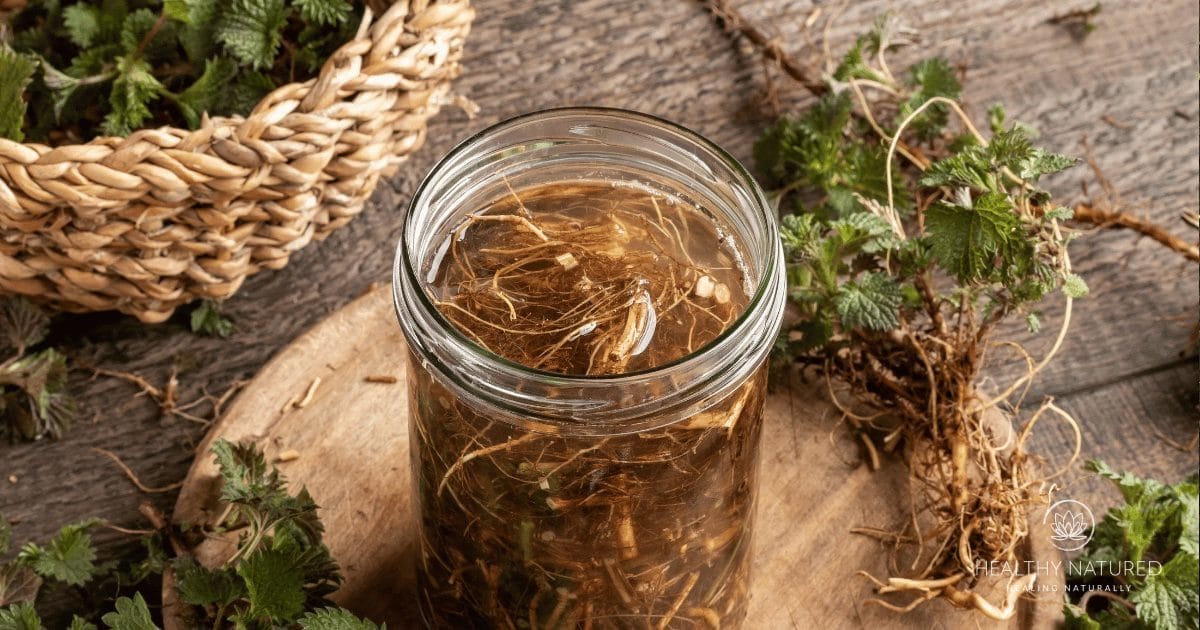
Nettle Root Tea Health Benefits
The root tea provides an impressive range of advantages for well-rounded health. Packed with phytosterols, minerals and antioxidants, this herbal infusion slides perfectly into a balanced diet. By supplementing this tea with other natural remedies, you open up room for gentle, continuous support throughout a number of vital health arenas.
When it comes to daily health troubles, think twice before dismissing nettle tea as a natural, plant-based option as it is rooted in tradition and supported by science.
1. Prostate Support
If you’re a man suffering from BPH symptoms, nettle root tea is of particular interest. Studies indicate the root’s ability to reduce symptoms including frequent urination and pain, which is presumably connected with its effect on hormone activity in the prostate.
Stinging nettle’s root is rich in phytosterols such as stigmasterol, campesterol and sitosterol. These compounds can assist in maintaining healthy size and inflammation of the prostate for a mild to moderate prostate enlargement. Clinical studies have noted that 360 mg root extract taken daily may provide relief.
Although effects differ, nettle root can be a mild enhancement to the daily regimen of men looking for prostate support, providing a botanical complement to dietary and lifestyle modifications.
2. Hormonal Balance
Nettle root tea is distinct because it does a great job of helping regulate hormone levels, specifically testosterone, which is important for both men and women. Phytosterols in the root can help maintain balanced hormone production, which is great during hormonal fluctuations.
For women, particularly through menopause, nettle tea provides comfort in softening some of the hormone level shifts. Its adaptogenic magic can assist in keeping you grounded through transitions. Keeping an eye on your hormonal health and supplementing with nettle as a supportive remedy can help promote more consistent mood and energy.
Nettle’s subtle effect on hormones means it can combine nicely with other herbal teas — such as red clover or spearmint — for a customized approach.
3. Inflammation Reduction
Nettle root tea health benefits are anti-inflammatory. The root’s phytosterols and antioxidants may protect against chronic pain and swelling. This is particularly crucial for those suffering from inflammatory diseases or arthritis, where joint pain restricts movement.
Studies indicate nettle can suppress inflammatory cytokines, making it a good option for people with arthritis or otherwise achy joints. Most notice regular nettle tea promotes easier movement and decreased everyday stiffness.
Your mileage may vary, but the tea’s natural profile makes it easy to fit into a mild, continuous self-care regimen.
4. Immune Modulation
Nettle root tea boosts immunity by providing a blend of vitamins, including vitamin C, and antioxidants. These nutrients help your body fight off infections and bad bacteria.
With consistent consumption, it can quietly strengthen your resistance, particularly when combined with a diet of nutrient-dense food. Nettle tea’s immune-friendly compounds play well with other herbs like echinacea or elderberry.
Nettle provides an easy, accessible addition for everyday immune support. Sample it in the morning or afternoon ritual.
5. Skin and Hair
Nettle root tea’s anti-inflammatory properties might extend to your skin and hair as well. Those with minor skin irritation, redness, or scalp problems should find relief with routine application.
Nettle’s high mineral content helps hair follicles stay strong and can potentially stimulate growth over time. Topical nettle extract, combined with the tea, can help accustom skin and scalp.
The two-pronged attack is typical of holistic regimens. Nettle’s calcium and magnesium help support bone health, making it a multi-benefit option.
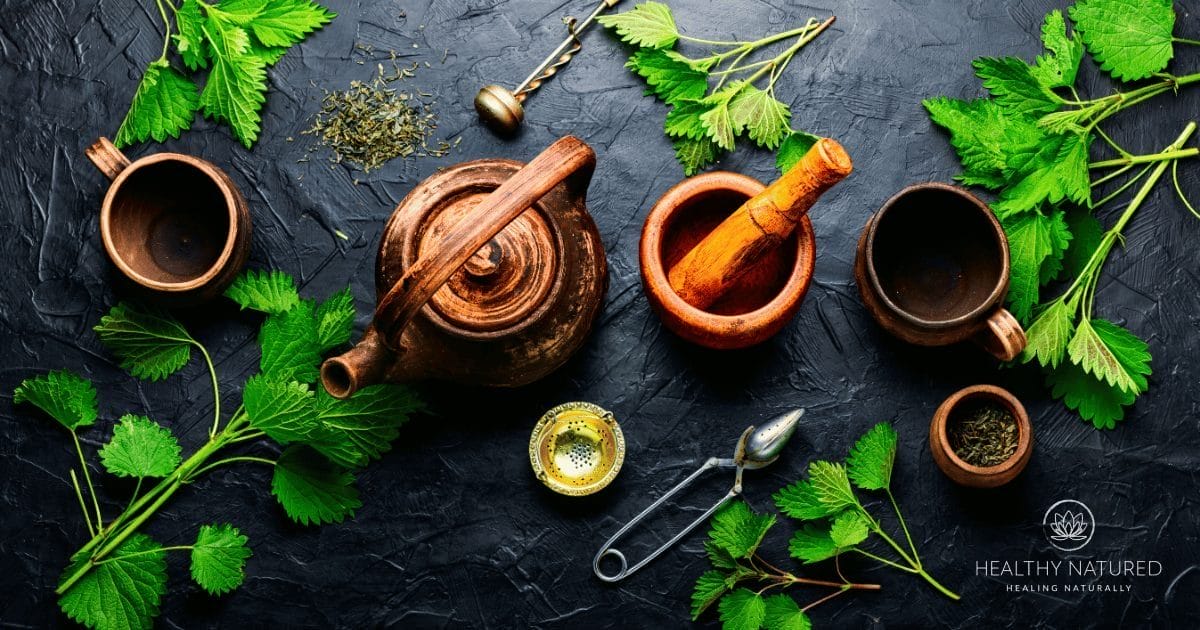
The Bioactive Synergy
Nettle root tea health benefits are what we call bioactive synergy — the way the unique combination of natural chemicals in nettle tea synergize to produce more powerful effects than any individual component. When you sip on the root tea, you’re getting a synergistic blend of carvacrol, carvone, naphthalene, and phytol, each contributing their own special magic to the therapeutic effect.
This bioactive synergy is key to calming inflammation, fighting oxidative stress, and supporting your heart, metabolism, and immune system. Much of nettle’s healing magic depends on whole plant forms, not isolated extracts. You’ll discover a new level of potency when you bridge nettle with complementary herbs, allowing these compounds to synergistically mingle for even deeper effects.
Beyond Single Nutrients
Zooming in on individual nutrients in nettle—like vitamins, minerals, or one special compound—often misses the point. As much as these nutrients matter, they rarely work in isolation inside your body.
With nettle tea you receive the bioactive synergy. All its compounds — antioxidants, anti-inflammatories and phytochemicals — mix and match. That interaction is what contributes to reducing inflammation, oxidative stress, and even optimizes your body’s ability to process blood sugar and cholesterol.
In animal studies, researchers observed nettle’s bioactive synergy lower serum cholesterol and triglycerides, suggesting its potential benefit for cardiovascular health. When you sip your nettle tea, your body is nourished with a bioactive synergy.
It’s this elegant complexity that renders plant nutrition so compelling and powerful. Appreciating the subtle cooperation among nettle’s compounds reminds you: nature rarely works in isolation.
The Entourage Effect
The entourage effect refers to various compounds in a plant joining forces, producing effects greater than the sum of its parts. With nettle root tea, the entourage effect boosts its virtues—assisting in lowering blood pressure, enhancing lipid metabolism, even providing antimicrobial defense against infections.
Whole plant extracts — yeah, they matter here. When you use the full spectrum of compounds, you maintain the synergy. Reducing the plant to a single chemical, or even only using phytol, can restrict the total effect.
Research indicates it’s this synergy in nettle that reveals its anti-hyperlipidemic, antioxidant and even anti-diabetic properties. By embracing this herbal synergy, you’re invited to rethink your approach to wellness.
Whether it’s the combination of nettle with herbs such as dandelion or ginger to make a personalized blend that suits your individual needs. That’s the real magic of nettle root tea—its beauty is in the complexity, a web of molecules sustaining your path to health.
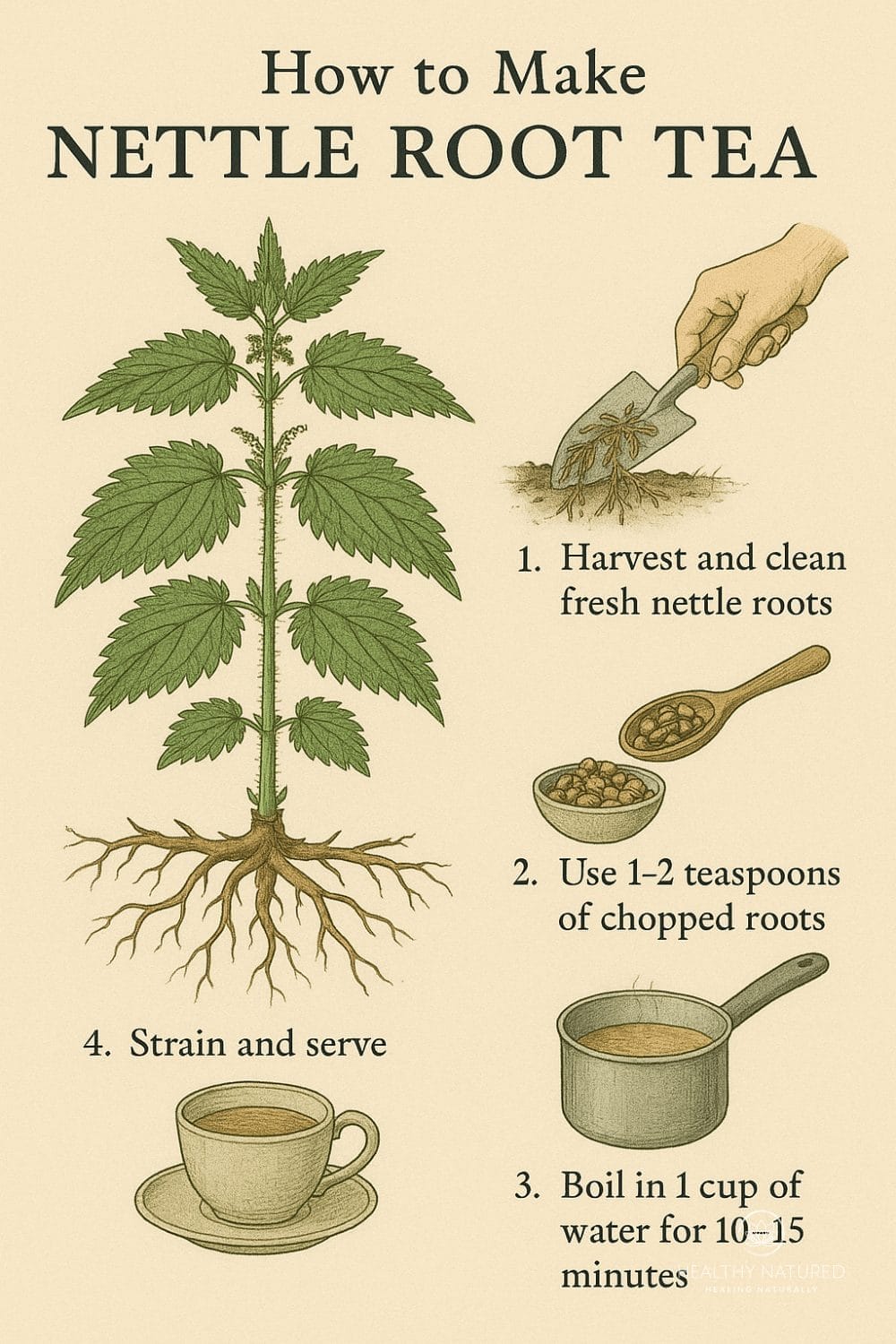
How to Prepare Nettle Root Tea
Known for its medicinal properties, it provides a grounding, earthy experience with a storied place in holistic wellness. Brewing a cup is more than a recipe; it’s a respect for ritual and discovering the potential health benefits that best suit your needs.
Steps for Preparing Nettle Root Tea
A simple guide helps you unlock nettle’s full potential:
-
Bring 500 ml (approximately 2 cups) water to boil in a pot.
-
Use 2 tablespoons of dried leaves, or ½ cup fresh leaves, chopped. For nettle root, add 1 – 2 teaspoons dried per cup.
-
Pour boiling water over the herbs in a heatproof cup.
-
Cover and steep 5–10 minutes. If you’re after vitamin C, infuse in water at 50–60°C (122–140°F) and steep a bit longer.
-
Strain, serve and enjoy as is—or with your favorite additions.
Steeping time and temperature affect extraction. A longer steep extracts minerals and bioactives, while cooler temperatures preserve sensitive compounds such as vitamin C. Don’t hesitate to customize steeping to your flavor and health objectives.
Taste can be enhanced with herbs such as mint, lemon balm, rosemary or lemon verbena. Give it a shot of lemon or honey for a subtle, fragrant boost. Flavor matures with experimentation—listen to your palate.
The Decoction Method
The decoction method, a staple of old school herbalism, has you simmering nettle root gently to extract every bit of nutrition. Unlike simple steeping, decoction employs prolonged simmering to extract full-bodied flavor and bioactives, like lignans and polysaccharides, believed to support hormone balance and vitality.
To prepare, place your root matter in a saucepan with cold water. Simmer gently (not rolling) for around 20–30 minutes, with the pot partially covered. Strain into your favorite mug! This produces a more robust and medicinal tea, great for the health-minded individual.
Most herbalists opt for decoction when it comes to roots and bark, as the heartier parts require longer simmering to extract their benefits. Try this method if you’re after a heartier, more complex brew!
Dosage and Timing
For adults, 1–2 cups per day is common, with 1–2 teaspoons dried nettle root per cup. Best times: morning for energy or early evening for balance. Stick with it—regular use promotes cumulative benefits.
As always, listen to your body — cut back if you notice any discomfort. If you have health conditions or take medications, consult a healthcare provider first. Your particular needs may be different.
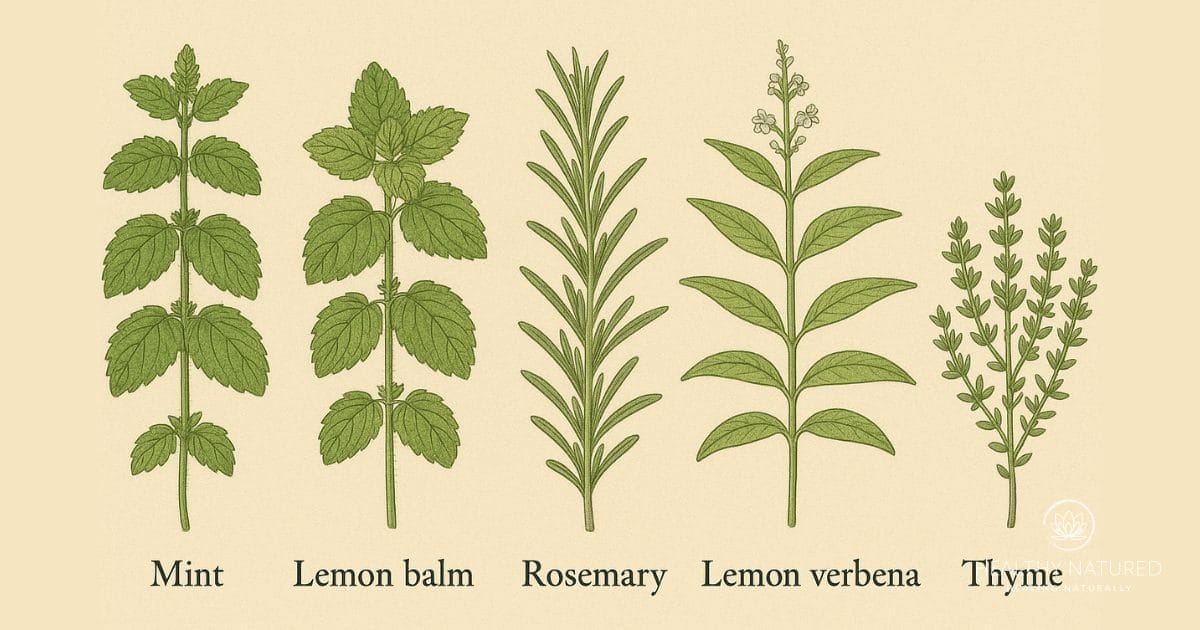
Flavor Pairings
- Mint: Refreshing, cooling, and brightens the earthy profile.
- Lemon balm: Adds gentle citrus notes and calming qualities.
- Rosemary: Herbal complexity, pairs well for morning clarity.
- Lemon verbena: Lively aroma, uplifting taste.
- Thyme: Subtle warmth, supports respiratory health.
Pairing nettle with other herbs not only lifts flavor, but it may potentially increase health benefits of nettle tea. Mint can ease digestion and lemon balm relaxes the nervous system.
It’s fun to be creative in the kitchen—experiment with various blends until you discover that perfect cup.
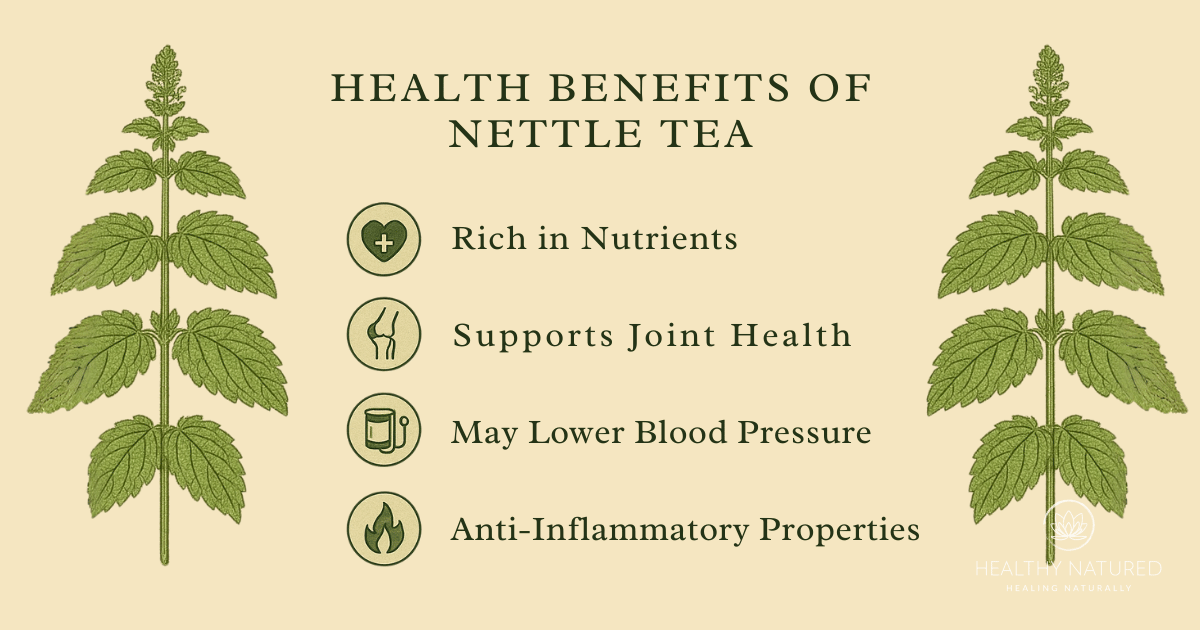
Potential Side Effects
Nettle tea has its perks, nevertheless – as with any herbal remedy, it’s prudent to be aware of potential side effects. Nettle is well tolerated by most individuals, particularly in small doses. A few people may have side effects or reactions, which are crucial to identify early and handle with care.
|
Common Side Effect |
Description |
|---|---|
|
Skin irritation |
Itching, redness, or swelling if handled raw |
|
Mild digestive upset |
Nausea, diarrhea, or stomach discomfort |
|
Increased urination |
Due to natural diuretic effect |
|
Lowered blood pressure |
Dizziness or lightheadedness, especially with hypotension |
|
Allergic reactions |
Hives, rash, or swelling in sensitive individuals |
Since nettle leaves are covered with tiny hair-like structures, you may experience a brief burning sensation, rash or hives if your skin gets in contact with them. That’s largely due to acetylcholine, histamine, serotonin, leukotrienes and formic acid in the leaves.
These are primarily contact effects but can, on rare occasion, happen after consumption of the tea, particularly in allergy-prone individuals. Moderation is key. Consuming excessive quantities of nettle tea could potentiate side effects such as elevated urination or hypotension.
If you begin noticing strange symptoms, like a relentless itchiness or digestive pain, stop and see how your body reacts. For mild reactions, just cutting back often does the trick. If symptoms persist or worsen, consult your doctor.
Listening to your body is key when experimenting with herbal teas. Just about any evidence of swelling or breathing problems or severe rash necessitate emergency care. At the end of the day, your path to wellness is individual–what works for one may not work for you.
Who Should Be Cautious
- Pregnant women (risk of uterine contractions and miscarriage)
- People with low blood pressure (hypotension)
- Individuals with kidney or heart conditions
- Those with known plant allergies, especially to nettles
- Anyone taking diuretics or blood pressure medications
Pregnant women should steer clear of nettle, as it could induce uterine contractions and increase miscarriage risk. If you have kidney, heart or blood pressure problems, or are prone to allergies, it’s wise to consult your doctor before introducing nettle tea into your regimen.
Knowing your body makes you a better decision-maker. Consulting an expert makes certain any herbal remedy is tailored to your individual circumstances.
Possible Drug Interactions
Nettle tea can interfere with medicine, particularly water pills (diuretics) and blood pressure medication. Since nettle is a natural diuretic, it could amplify the effect of these medications, potentially causing dehydration or a dangerous drop in blood pressure.
If you’re on NSAIDs, blood thinners, diabetes medications or lithium, play it safe – nettles can change how these drugs are metabolized by your body. Herbal teas aren’t necessarily the mild things they’re made out to be.
Nettle may alter the effects of vitamins or drugs in your system. ALWAYS inform your doctor if you take herbal supplements or teas. This open dialogue prevents surprises and maintains your well-being plan on course.
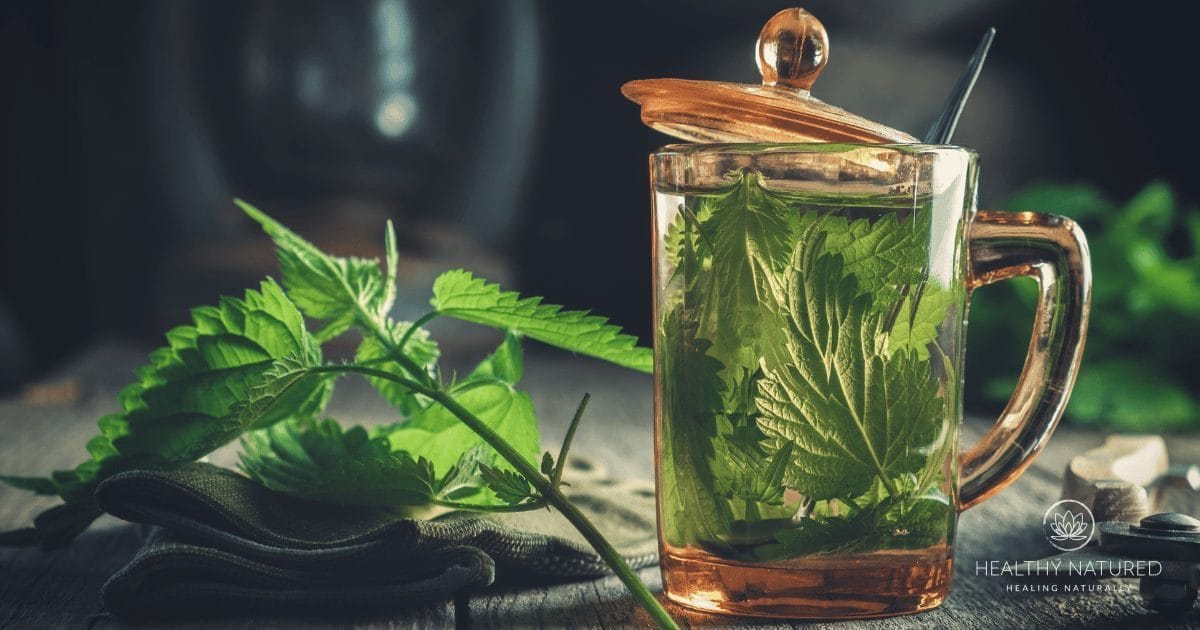
My Personal Experience
Nettle root tea had never crossed my path. Indeed, the moment I heard it, my mind jumped immediately to childhood memories—encountering it as a ‘witches’ potion’ at Halloween parties, with its neon green color and dirt-like aroma. It seemed silly to even think about drinking it.
If you’re anything like me, you may have hesitated. My routine already had vitamin D and magnesium, so spiking it with another herbal medicine seemed like a stretch. I even joked to myself, channeling my inner Lorelai Gilmore, about if this new habit was more suited to a quirky TV episode than my kitchen.
The initial week was tough. It isn’t the easiest thing in the world to drink a cup of stinging nettle tea every morning. It is very flavorful, in an intense grass-like way, think “drinking a meadow.” The mornings seemed harder, my body sluggish to acclimate, and I wondered if this was worthwhile. I looked up safe limits and discovered that up to three cups a day is safe for most adults, so I kept to it.
By the third week, something subtle changed. I began to realize that the stress I’d been storing in my shoulders and neck, particularly after extended desk sessions, was subsiding. It wasn’t cinematic, but it was authentic. My muscles felt less tight, and my stress response less acute. The potential health benefits of nettle leaf tea were becoming clear, providing something grounded and calming that carried me through the rest of my day.
One night in week four, following an evening of too much booze and the dazzle of blaring city lights, I stirred from sleep with a migraine. I turned to nettle root tea, intrigued that it could assist where my standard remedies fell short. Although it didn’t cure my migraine, I found recovering gentler. The tea appeared to gently smooth my ache’s jagged edges as I hydrated and found equilibrium.
It soon became obvious nettle tea, while no magic bullet, did provide a soothing, supporting counterpoint to my general wellness regimen. As I gained confidence, I began to get creative. With lemon and mint, nettle tea becomes a refreshing iced beverage for those warm afternoons. I was amazed at the versatility — nettle tea was no longer a morning ritual but a flexible companion throughout the day.
Your experience with nettle root tea might be unique. Your body and mind will react accordingly. I challenge you to play around, try new combinations, and report back. Your story contributes to this expanding, caring community, especially as we explore the many medicinal properties of this remarkable herb.
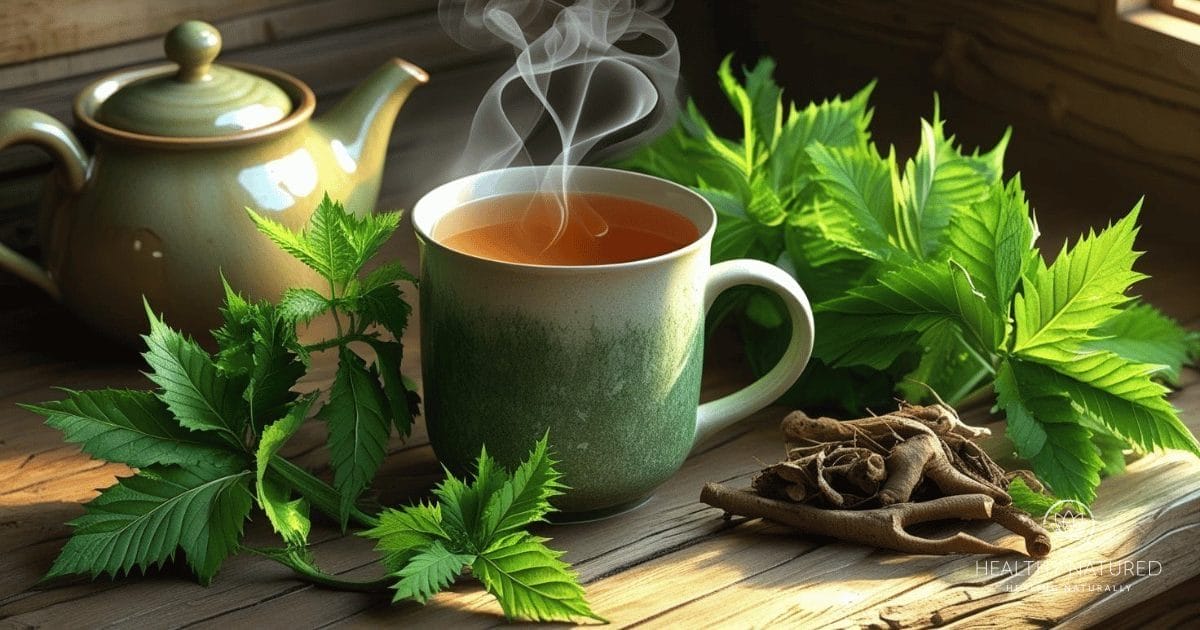
Conclusion
Diving into nettle root tea stirs up a welcoming spirit of adventure and faith in nature’s medicines. You’re now aware of how this earthy herbal tea can provide support from nurturing your hormonal balance to aiding inflammation and even supporting urinary health. The subtle, earthy scent and flavor will quickly weave themselves into your daily self-care routine.
As with any herb or natural remedy, being mindful to listen to your body and check in with a healthcare provider when needed keeps your wellness journey safe and rewarding. Now, your mileage with nettle root tea may vary, but each sip is a potential hug of warmth and a bit more peace in your world. Trust your instincts and savor what Mother Earth provides with generosity and reverence.
Nettle tea softly stimulates hormonal balance, relieves inflammation and cares for your general health.

FAQ
What are the main health benefits of nettle root tea?
Nettle, a safe herb, can promote prostate health, relieve inflammation, and balance hormones while offering potential health benefits through its antioxidant abilities.
Can nettle tea help with urinary issues?
Indeed, nettle leaf tea is commonly utilized to promote urinary tract health and can potentially alleviate the symptoms of prostatic hyperplasia in males.
Is nettle root tea safe to drink every day?
For the majority of individuals, moderate consumption of nettle tea on a daily basis is considered safe. It is wise to check in with your doctor before incorporating it into your regimen, especially if you have health problems.
How do you prepare nettle root tea at home?
Steep 1–2 grams of dried nettle root, a medicinal plant known for its potential health benefits, in hot water for 10–15 minutes. Strain prior to consumption.
Are there any side effects of nettle tea?
A few reports of mild stomach upset, allergic reaction, and blood pressure changes have been noted with certain supplements, including nettle leaf products. If you experience any side effects, discontinue use and see a health care provider.
Who should avoid nettle root?
You shouldn’t drink nettle leaf tea if you’re pregnant or nursing or are on certain medications for blood pressure or diabetes.
Can nettle root tea interact with medications?
Sure, nettle tea can interfere with blood thinners, blood pressure medication, or diabetes meds. As always, check with your doctor before incorporating this medicinal plant into your diet.

